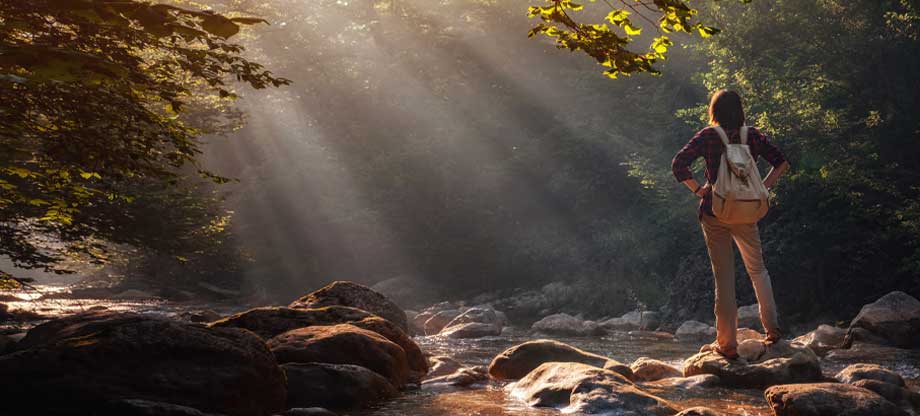In the 1970s, one of India’s landmark ecofeminist movements was born. The ‘Chipko Andolan’ or Chipko movement saw protestors – primarily women villagers – hugging trees so that they couldn’t be felled by deforestation. This benefited both women, who took away a sense of purpose and satisfaction, and the natural world around them. These women may have unknowingly stumbled onto the concept of ecopsychology, while it was still in its nascent stages.
Ecopsychology is a branch of science that studies the correlation between psychology and the environment. It enables human beings to experience themselves as part of nature, rather than just being surrounded by it.
‘Most of us know that human beings are not living sustainably anymore,’ says therapist Harini Ramakrishnan. ‘Although there are conversations around climate change and environmental degradation, it clearly isn’t enough. Ecopsychology is a study that can benefit both human beings as well as nature. In human beings, it has been shown to reduce stress, anxiety and depression. While using ecopsychology, one isn’t simply spending time in nature; one is actually immersing themselves in it. Human beings and nature are interdependent, and we need to integrate these principles into daily lives for mutual well-being’.
In 1989, the term Ecopsychology was coined by a group of academicians at Berkley, and further popularised by Theodore Roszak, Professor Emeritus of History and Director of the Ecopsychology Institute at California State University, Hayward. He authored several books on the topic in the 1990s. According to Roszak’s principles, ‘There is a synergistic interplay between planetary and personal well-being… The needs of the planet are the needs of the person, the rights of the person are the rights of the planet.’
Roszak adds, ‘For ecopsychology as for other therapies, the crucial stage of development is the life of the child. The ecological unconscious is regenerated, as if it were a gift, in the newborn's enchanted sense of the world. Ecopsychology seeks to recover the child's innately animistic quality of experience in functionally ‘sane’ adults. To do this, it turns to many sources, among them traditional healing techniques of primal people, nature mysticism as expressed in religion and art, the experience of wilderness, and the insights of Deep Ecology. Among the therapeutic projects most important to ecopsychology is the re-evaluation of certain compulsively ‘masculine’ character traits that permeate our structures of political power and which drive us to dominate nature as if it were an alien and rightless realm. In this regard, ecopsychology draws significantly on the insights of ecofeminism with a view to demystifying the sexual stereotypes.’

Thus, ecopsychology has a deep impact on our mental health. ‘According to ecopsychologists, we are slowly moving away from nature. Technological gadgets and AI have also taken away from basic natural tendencies like instinct and emotion. This can cause deep-rooted mental health issues if left unchecked. One way in which ecopsychology addresses this is with the proverbial returning to the roots. In fact, one global nature guide has gone so far as to say, ‘The forest is the therapist’.’
In Japan, there is a practice called ‘Shinrin-Yoku’. This literally means Forest Bathing, and is designed for spiritual renewal. The therapeutic act of spending time in a forest, without needing to hike, exercise, or identify bird species is a multi-sensory experience that fosters preventive healthcare. In fact, it has been prescribed in Japan as a solution for both physical and mental health ailments.
Of course, not everyone has easy access to a forest or can afford to immerse themselves in a remote or picturesque setting. How then, can one put the principles of ecopsychology to use? Here are some ideas for urban inhabitants:
Community farming: If you don’t have a garden big enough to lose yourself in, engage in community farming, which gives you the opportunity to grow your own produce and simultaneously spend time in the outdoors.
Exercise in nature: If you’re able to walk, jog, or even do yoga in a park or an outdoor space, it increases your link with the natural world around you. Include mindful meditation and deep breathing in your list of activities.
Adventure therapy: Each weekend, or at least twice a month, take up adventure sports like trekking and camping that involves escaping to safe, but uninhabited climes.
Interaction with animals: Spending time with dogs or cats has always proven to be a major de-stressor, but you can take it one step further and enjoy horse riding, or watch birds in the outdoors.
Nature conservation: Biophilia is the innate affinity that human beings have for the natural world. There is no denying that it is a two-way street, and we’re interconnected. Practicing sustainability and restoring the ecological balance of the world around us, will help us achieve both individual well-being and planetary health.